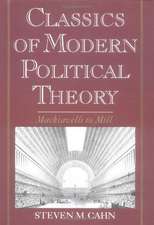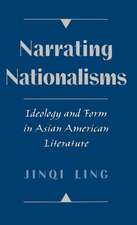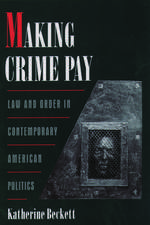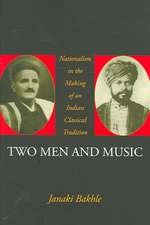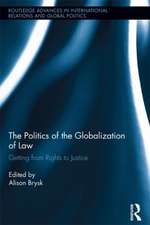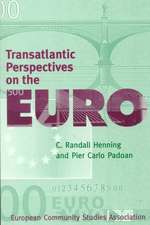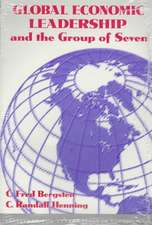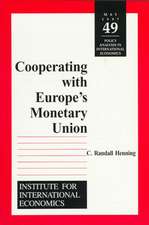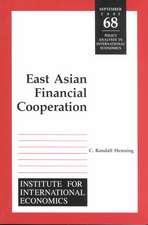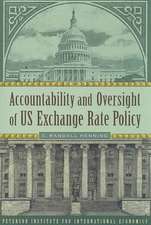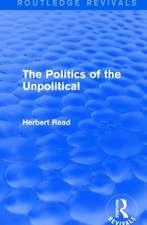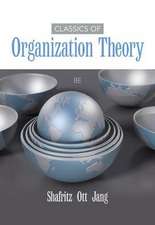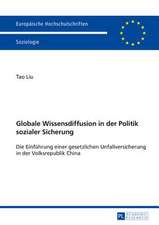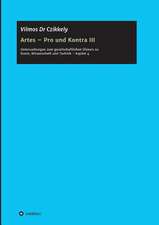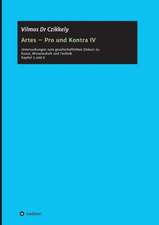Tangled Governance: International Regime Complexity, the Troika, and the Euro Crisis
Autor C. Randall Henningen Limba Engleză Hardback – 5 apr 2017
Preț: 279.25 lei
Nou
Puncte Express: 419
Preț estimativ în valută:
53.43€ • 55.94$ • 44.21£
53.43€ • 55.94$ • 44.21£
Carte disponibilă
Livrare economică 05-11 martie
Preluare comenzi: 021 569.72.76
Specificații
ISBN-13: 9780198801801
ISBN-10: 0198801807
Pagini: 316
Dimensiuni: 165 x 240 x 26 mm
Greutate: 0.68 kg
Editura: OUP OXFORD
Colecția OUP Oxford
Locul publicării:Oxford, United Kingdom
ISBN-10: 0198801807
Pagini: 316
Dimensiuni: 165 x 240 x 26 mm
Greutate: 0.68 kg
Editura: OUP OXFORD
Colecția OUP Oxford
Locul publicării:Oxford, United Kingdom
Recenzii
Given Tangled Governance's impressive empirical richness and its very convincing theoretical argument, the book is highly recommendable as a comprehensive account of the complex governance issues of the crisis period and the equally numerous as well as heterogeneous actors and institutions involved. The very well prepared data on the conditions of the country programmes together with its hint towards the important role of the United States of America and the IMF in the European governance regime offers valuable insights for both scholars searching for an inclusive account of the complex politics and governance mechanisms of the period in question, and those scholars interested in EU studies that want to learn more about the complex regime of European multilevel governance from a more international and global governance perspective.
This is an innovative and interesting argument, which Henning supports with an excellent array of case studies. More important, Henning's argument adds to our understanding of international regimes in a way that resonates with what we know about domestic politics.
Through detailed analysis of more than a half dozen programs undertaken since 2010 to 'rescue' the GIIPS (Greece, Ireland, Italy, Portugal, Spain) this book provides insightful analysis of the crucial roles played by northern European countries like Germany, as well as non-European countries- the United States in particular- in contributing to an increasingly complex set of new regional and international governance institutions.
This is an innovative and interesting argument, which Henning supports with an excellent array of case studies. More important, Henning's argument adds to our understanding of international regimes in a way that resonates with what we know about domestic politics.
Through detailed analysis of more than a half dozen programs undertaken since 2010 to 'rescue' the GIIPS (Greece, Ireland, Italy, Portugal, Spain) this book provides insightful analysis of the crucial roles played by northern European countries like Germany, as well as non-European countries- the United States in particular- in contributing to an increasingly complex set of new regional and international governance institutions.
Notă biografică
C. Randall Henning is Professor of International Economic Relations in the School of International Service at American University in Washington, D.C. He specializes in International Political Economy, Global Governance, and regional integration, especially with respect to Europe and East Asia. Europe's monetary union and the interaction among regional and multilateral institutions are topics of special focus. The author of numerous books and journal articles, he has written most recently on emerging-market perspectives on the Group of Twenty (G20) and international financial institutions, regional financial facilities, and the lessons for Europe from fiscal federalism in the United States.

